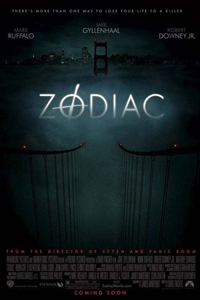Zodiac (R) ★★★½
 Zodiac won’t only leave you thinking about the title killer and his cold case, but also David Fincher's amazing ability to genre-hop within the confines of one movie.
Zodiac won’t only leave you thinking about the title killer and his cold case, but also David Fincher's amazing ability to genre-hop within the confines of one movie.
Story
While there are many narratives, points of view and even stories being explored in Zodiac, everything revolves around the true saga of the Zodiac killer in late 1960s Northern California. He first struck on July 4, 1969—and then, as would become his signature stamp, chillingly, willingly spread the news. First, he called in to report his own murder. Then, a month later, he sent to the San Francisco Chronicle newspaper a letter claiming responsibility and a coded message that, when deciphered, offered clues. His murders tormented a hysterical public, but his rituals tormented those who tried the hardest to catch him, namely the Chronicle’s cartoonist (Jake Gyllenhaal) and chief crime reporter (Robert Downey Jr.) as well as two detectives (Mark Ruffalo, Anthony Edwards). The cartoonist, Robert Graysmith, had no business obtaining inside information or the infamous Zodiac letters sent to his paper, but so obsessed was he with the case that he risked everything to conduct his own research—which yielded new clues, a book and, ultimately, this movie.
Acting
Zodiac’s biggest asset might be the casting director, because the movie’s lineup of actors could not be better cast for their respective roles. Only a movie with recognizable names running (at least) 17 deep could feature Adam Goldberg for less than a minute. Gyllenhaal, the lead only in star wattage, isn’t required to display any real dramatic fireworks, and the fact that he’s able to resist shows even more maturity than his work in Brokeback Mountain. Downey Jr., meanwhile, is asked for some high drama and delivers with ease; it’s child’s play for one of today’s very best actors. If Zodiac were released a few months earlier, he would’ve been collecting the Best Actor statuette for his performance as the fast-talking and -living reporter. Ruffalo, like Gyllenhaal, has no trouble whatsoever toning it down, but he can just as seamlessly evoke the tension and frustration of his one-step-away detective when necessary. And former ER mainstay Edwards, in his first movie in almost three years, is a perfect non-threat complement to the other actors. It’s that kind of unselfishness—not to be confused with any form of unwillingness—that exemplifies this superb collaborative cast, which also boasts Brian Cox, Chloe Sevigny, Dermot Mulroney and many more.
Direction
Throughout his career, director David Fincher has been known as a—for lack of a non-alliterative term—visual visionary. With Zodiac, the notoriously rigorous auteur goes in a completely different direction: He tells instead of, for the most part, showing. That doesn’t mean certain of Fincher’s scenes don’t look otherworldly, but gone is memorable imagery like that from Seven, Panic Room and Fight Club, which tended to, often in a good way, overpower the story. In its place is primarily dialogue, over two and a half hours worth, and the way Fincher makes it work in contrast to, and juxtaposition with, his past work establishes him as a truly singular filmmaker. Such a tag wouldn’t be complete without his other main accomplishment in Zodiac of weaving together several genres. What is obviously first a true crime story turns into a police procedural, a murder mystery, a writer’s tale, a scary movie (in parts), and, it could even be said, a period piece. If Fincher and writer James Vanderbilt—who adapted Graysmith’s novel for the screen—weren’t careful with their transitions and just altogether gifted, this film could've wound up a mess. But that’s why two and a half hours is a necessary running time—and Fincher is why you’ll leave the theater wishing it were even longer!
Bottom Line
Hollywood.com rated this film 3 1/2 stars.
To get the full Quicklook Films experience, uncheck "Enable on this Site" from Adblock Plus
box office top 10

Civil War Released: April 12, 2024 Cast: Kirsten Dunst, Wagner Moura 11.1M

Abigail Released: April 19, 2024 Cast: Melissa Barrera, Dan Stevens 10.2M

Godzilla x Kong: The New Empire Released: March 29, 2024 Cast: Rebecca Hall, Brian Tyree Henry 9.5M

The Ministry of Ungentlemanly Warfare Released: April 19, 2024 Cast: Henry Cavill, Eiza Gonzalez 9M

Spy x Family Code: White Released: April 19, 2024 Cast: Takuya Eguchi, Saori Hayami 4.9M

Kung Fu Panda 4 Released: March 8, 2024 Cast: Jack Black, Viola Davis 4.6M

Ghostbusters: Frozen Empire Released: March 22, 2024 Cast: Paul Rudd, Carrie Coon 4.4M

Dune: Part Two Released: March 1, 2024 Cast: Timothée Chalamet, Rebecca Ferguson 2.9M

Monkey Man Released: April 5, 2024 Cast: Dev Patel, Sikandar Kher 2.2M

The First Omen Released: April 5, 2024 Cast: Nell Tiger Free, Bill Nighy 1.7M






